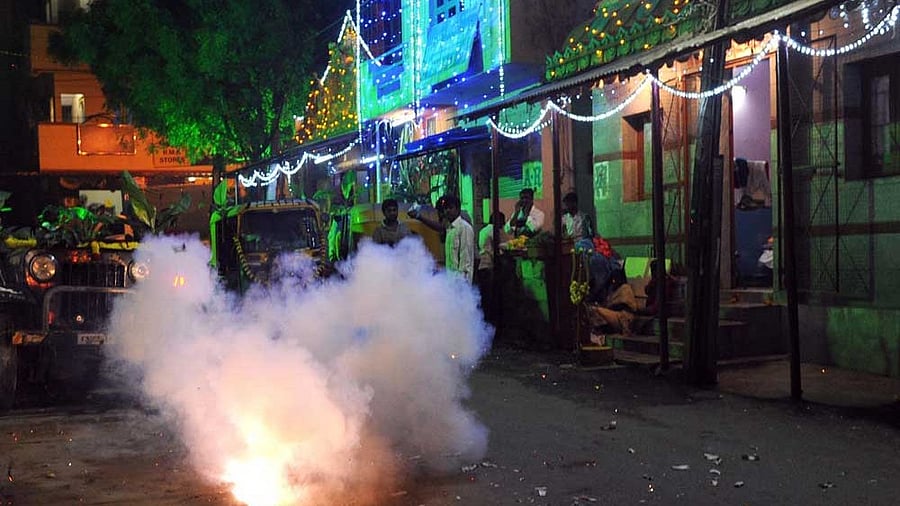
File image of firecrackers being burst.
Credit: PTI File Photo
New Delhi, Oct 11 (PTI) The ban on firecrackers in Delhi is not a new issue. As far back in 1961, concerns over pollution caused by crackers prompted a proposal for a ban, though the government of India did not approve it, according to official records preserved by the Delhi Archives Department.
The proposal, dating back to January 1961, originated from the Deputy Ganj Committee -- one of the industrial market associations in Sadar Bazar, Delhi -- which wrote to the chief commissioner of Delhi, complaining about "noise pollution" caused by large-scale use of fireworks during festivals and other celebrations.
The letter was later forwarded from the office of the chief commissioner, who was the executive head of the national capital functioning under the government of India, to the Ministry of Works, Housing and Supply for its consideration, records accessed by PTI showed.
More than six decades later, the debate over ban on firecrackers continues.
The Supreme Court on Friday said a complete ban on bursting of firecrackers in Delhi-NCR is "neither practical nor ideal", as such restrictions are often violated, so a balancing of equities is needed.
The observation, which hinted at relaxation of the ban, was made by a bench comprising Chief Justice B R Gavai and Justice K Vinod Chandran, which reserved its order on a batch of pleas seeking permission to manufacture and sell "green" firecrackers in Delhi-NCR.
In 1961, Delhi's population was just around 26 lakh -- a fraction of the over two crore residents the city has now. Yet, noise pollution caused by firecrackers was a matter of public concern even then.
The Deputy Ganj Committee, in its letter, said the deafening noise from some high-decibel crackers was causing distress to the residents, particularly those with heart ailments.
"During the course of fireworks display, it appears as if a complete warfare is going on outside," the association wrote, adding that the authorities seemed "immune to the situation".
The committee also suggested several measures to control the problem, including a complete ban on high-decibel crackers, prohibition of fireworks after 10 pm, strict licensing for manufacturing and sale of fireworks, and heavy penalties for violations.
These recommendations were also part of the records maintained by the Delhi Archive department.
Responding to the proposal, the secretary to the government of India in the Ministry of Works, Housing and Supply wrote to the chief commissioner of Delhi, saying "a total ban was not considered necessary".
The government said the manufacture of crackers was already regulated under the Indian Explosives Act and Rules, and the sizes of crackers had been reduced in 1958 "with a view to minimising the noise produced by their firing", the letter noted.
The government also said the issue could be addressed through "intensive police vigilance" and by prohibiting fireworks near hospitals and residential areas after certain hours at night through local regulations.
It added that technical staff had been appointed to inspect the licensed factories and check irregular manufacturing of crackers.
At the time, Delhi did not have a chief minister, as the Delhi Legislative Assembly had been dissolved in 1956 after the tenure of the city's first chief minister, Chaudhary Brahm Prakash (1952-1955).
The chief commissioner functioned under the direct control of the president of India until the Delhi Metropolitan Council was established in 1966.
The Supreme Court first imposed a ban on firecrackers in Delhi-NCR in 2014-15 due to rising pollution levels.